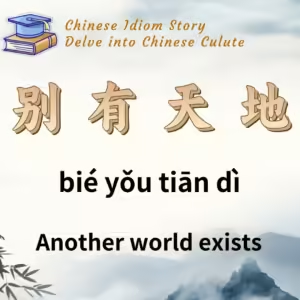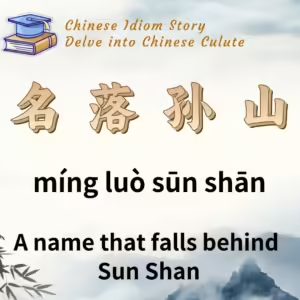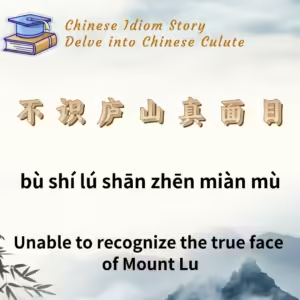
Chinese Idiom: 别有天地 (Bie You Tian Di)
English Translation: Another world exists
pīn yīn: bié yǒu tiān dì
Idiom Meaning: This idiom refers to having a different kind of realm or dimension, often used to describe art or scenery that captivates and enchants.
Historical Source: The idiom originates from the poem Shan Zhong Wen Da (山中问答) by the Tang dynasty poet Li Bai.
Idiom Story:
Huangshan, located in southern Anhui province, is renowned for its stunning scenery, which has inspired countless poets over the centuries. In the twelfth year of the Tianbao era (753 AD), the great poet Li Bai visited this magnificent place and composed several exquisite poems during his stay.
One of the highlights of Huangshan is Banshan, which resembles a brilliant piece of jade set against the backdrop of the mountain. This picturesque area is not only famous for its beauty but is also home to a rare bird called the Baipeng (白鹏), resembling a mountain chicken with pure white feathers and bright red beak and claws, making it a delightful sight. However, the Baipeng is elusive, living high in the trees, making it difficult to catch or keep.
During his visit to Banshan, Li Bai sought out a local resident named Hu Hui, who, recognizing Li Bai’s fame, gifted him a pair of the precious Baipeng birds. Overjoyed with this gift, Li Bai composed a poem titled Zeng Huangshan Hu Gong Qiu Baipeng (赠黄山胡公求白鹏) to express his gratitude. In this poem, he praised the purity and noble character of the Baipeng, reflecting his own aspirations and the genuine friendship he shared with Hu Hui.
While exploring the area, Li Bai also climbed to the Xunyang Platform on Muling Mountain. His excitement about the beauty of Banshan and the joy it brought him is evident in his poem Shan Zhong Wen Da, particularly in these lines:
“问余何意栖碧山,笑而不答心自闲。桃花流水育然去,别有天地非人间。”
(“If you ask me why I dwell in Banshan, I smile without answering, my heart is at ease. The peach blossoms and flowing water fade away, for there exists another realm beyond this world.”)
In these lines, Li Bai expresses that his time in Banshan is filled with indescribable joy and beauty, creating a realm distinctly separate from the mundane human experience.
To honor Li Bai, the locals later renamed the Xunyang Platform to “Li Bai Diaotai” (李白钓台) and erected a pavilion called “Wen Yu Pavilion” (问余亭) at the spot where Li Bai inquired about directions from Hu Hui.
Over time, the phrase “别有天地非人间” (there exists another realm beyond this world) was condensed into the idiom “别有天地,” symbolizing a unique and enchanting experience.






